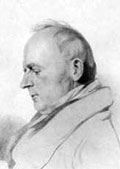the First Week of Lent
Click here to join the effort!
Bible Commentaries
Bridges' Commentary on Proverbs Bridges' on Proverbs
Old Testament
Author's Biography
Charles Bridges (1794-1869) was a prominent figure in nineteenth-century evangelical Anglicanism, celebrated for his theological acumen and literary contributions. Born in Walmer, Kent, Bridges studied at Queen's College, Cambridge, where he excelled academically and exhibited a keen interest in theology. He was ordained in the Church of England in 1817 and served as a curate in several parishes before becoming the vicar of Old Newton, Suffolk, in 1823.
Bridges is best known for his prolific writing, particularly his seminal work "The Christian Ministry: With an Inquiry into the Causes of its Inefficiency" (1829). This magnum opus, influenced by the Tractarian movement and the writings of John Henry Newman, emphasizes the spiritual responsibilities and challenges of the clergy. It remains a foundational text in pastoral theology, guiding generations of ministers in their vocation.
Another enduring contribution by Bridges is his commentary series, which includes "An Exposition of Psalm CXIX" (1827), "An Exposition of the Book of Proverbs" (1846), and "An Exposition of Ecclesiastes" (1860). These commentaries showcase Bridges' exegetical prowess and his commitment to biblical exposition rooted in a deep reverence for scripture.
Bridges' theological perspective was firmly rooted in the evangelical tradition, emphasizing the primacy of scripture, the centrality of Christ's atonement, and the necessity of personal holiness. He was aligned with the evangelical revival led by figures like Charles Simeon and John Wesley, advocating for a revival of true spirituality within the Church of England.
In addition to his literary endeavors, Bridges was actively involved in pastoral ministry and served as the incumbent of Weymouth, Dorset, from 1830 until his death. He was deeply committed to the spiritual welfare of his parishioners and was known for his compassionate and dedicated pastoral care.
Charles Bridges' legacy endures through his writings, which continue to influence theologians, pastors, and laypeople alike. His emphasis on the importance of scriptural exposition, pastoral fidelity, and spiritual formation remains relevant in contemporary evangelicalism, ensuring his enduring significance in the annals of Christian theology.
